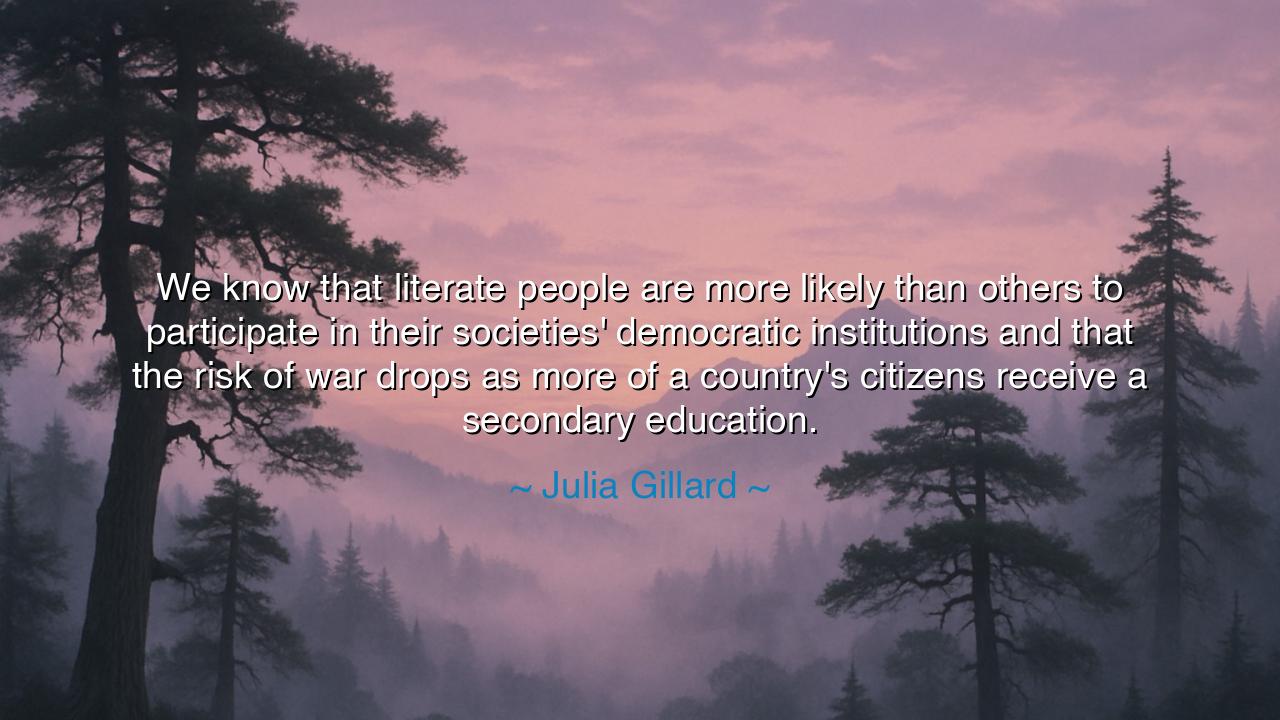
We know that literate people are more likely than others to
We know that literate people are more likely than others to participate in their societies' democratic institutions and that the risk of war drops as more of a country's citizens receive a secondary education.






Hear, O listeners, the words of Julia Gillard, former leader and champion of education: “We know that literate people are more likely than others to participate in their societies' democratic institutions and that the risk of war drops as more of a country's citizens receive a secondary education.” In these words lies a truth both profound and timeless. For it is literacy that opens the eyes of the people, and education that steadies their hands to build a future. Where ignorance rules, shadows grow, and where shadows grow, conflict and oppression take root. But where minds are awakened, light spreads, and the soil becomes fertile for democracy and peace.
From the beginning of human civilization, tyrants have known that to keep people ignorant is to keep them enslaved. Scrolls were hidden, books were burned, voices silenced. For an uneducated people cannot question, cannot organize, cannot resist. But when the gift of literacy is spread, it is as though chains fall away. The written word is a sword mightier than iron, for it teaches the people to think, to remember, to aspire, to hold their rulers accountable. Thus does Gillard’s wisdom ring true: when the people can read, they also learn to lead.
Consider the tale of post-war Japan. After the devastation of World War II, the nation lay broken. Yet one of the first pillars of its reconstruction was the spread of universal secondary education. From the ashes, classrooms were built, and from those classrooms rose generations of literate, disciplined citizens. These citizens did not turn again to war, but to building industry, democracy, and cooperation. The pen became their weapon, knowledge their fortress, and peace their triumph. This is the living proof of Gillard’s words: as education spreads, the drums of war grow silent.
Contrast this with lands where education is denied. In regions where children are kept from schools, where young minds are left barren, violence festers. The people cannot raise their voices in assemblies they do not understand; they cannot vote wisely in elections for which they are unprepared. In such places, warlords, zealots, and tyrants find fertile ground. For without literacy, promises cannot be weighed, laws cannot be read, lies cannot be unmasked. And so war and chaos consume what could have been a peaceful harvest.
Thus, Gillard’s words are both a reflection of history and a call to action. If nations desire peace, let them build schools before they build armies. If communities wish for justice, let them ensure that every child can read before they pass new laws. Democracy is not strengthened by force of arms, but by the steady work of teachers and the eager hands of students. A ballot has no meaning if the voter cannot read it; freedom has no strength if minds are shackled by ignorance.
The lesson, then, is this: to secure the future, invest in the education of the present. Leaders must see it as their duty to spread opportunity for literacy to all, not as a privilege for the few. And individuals must seize these opportunities, studying diligently, sharing knowledge, and teaching others. Each person who learns becomes a lamp that lights the path away from tyranny, toward peace and democratic strength.
Practical action flows from this wisdom: read daily, learn continuously, and support schools and institutions that spread knowledge. Teach the young, lift up the poor, and defend the right of every child to receive an education. For every book read is a stone removed from the path to war, and every educated mind is a guardian of peace.
So remember, always: literacy is freedom, education is peace, and knowledge is the foundation of democracy. Guard these treasures well, and pass them on to the generations that follow, that they may inherit not the scars of war, but the blessings of wisdom.
–––






AAdministratorAdministrator
Welcome, honored guests. Please leave a comment, we will respond soon